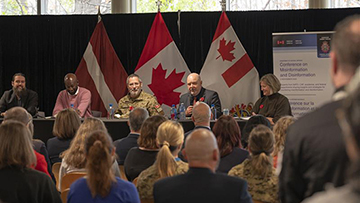Listen to the article
Canada’s Defence Department Hosts Conference to Combat Information Threats
In a significant effort to address growing concerns about misinformation and disinformation, the Assistant Deputy Minister of Public Affairs recently convened a half-day hybrid conference bringing together experts from government agencies, academic institutions, and NATO. The event, focused on strengthening institutional resilience against information threats, comes at a time when digital manipulation increasingly challenges national security frameworks.
The conference aligns with broader Government of Canada initiatives to enhance departmental strategies for countering information threats, as outlined in the Government’s Policy on Communications and Federal Identity.
“The digital landscape has dramatically changed how information spreads, creating new vulnerabilities in our information ecosystem,” noted one participant who attended the hybrid session. “This gathering represents a crucial step in developing coordinated responses.”
In today’s interconnected digital environment, sophisticated misinformation campaigns pose substantial challenges to national security, public trust, and operational effectiveness. These threats have grown increasingly complex, with various actors—including state, state-sponsored, and non-state entities—deploying false information strategically to divide Canadians, influence Defence personnel, and undermine Canada’s relationships with allies.
Conference participants emphasized that effective responses require collaboration across government departments, allied nations, and throughout the Defence Team, highlighting the necessity of a whole-of-government approach to information defense.
The event featured presentations from several distinguished speakers representing diverse expertise in information security. Jānis Sārts, Director of NATO’s Strategic Communications Centre of Excellence, delivered the keynote address, bringing valuable international perspective to the discussions.
Other notable speakers included Sarah Stinson, Director of Operations for Democratic Institutions at the Privy Council Office; Saliou N. Babou, Director of the Rapid Response Mechanism at Global Affairs Canada; Jeremy Harley, Acting Director of International Assistance Communications, Storytelling and Countering Disinformation at Global Affairs Canada; and Alan McCafferty, Director of the Cyber Security Program at the University of Ottawa.
These experts collectively explored the multifaceted nature of information threats, examining current detection methodologies and deterrence strategies. Speakers particularly emphasized how transparency and accountability in communications play vital roles in building and maintaining public trust and institutional credibility.
“Building resilience against misinformation requires more than technical solutions,” explained one expert during a panel discussion. “It demands a foundation of trust between institutions and the public, which can only be established through consistent transparency and accountability.”
The conference acknowledged that as information warfare techniques evolve, Canada’s Defence Team must continuously adapt its tools, training programs, and operational mindset. This event serves as part of an ongoing dialogue, creating valuable connections between partners, subject matter experts, and practitioners to strengthen collective understanding and response capabilities.
Participants discussed how information threats often transcend national borders, requiring international cooperation and information sharing. NATO’s involvement underscores the alliance’s recognition that information manipulation represents a significant security challenge that requires coordinated responses among democratic nations.
Looking ahead, the Defence Team, in partnership with other government agencies, remains committed to protecting information integrity, reinforcing public trust, and safeguarding Canada’s security interests and democratic values in an increasingly complex global information environment.
The conference stands as a testament to Canada’s proactive approach to emerging security challenges, recognizing that in the modern era, information resilience represents a critical component of national defense strategy.
Fact Checker
Verify the accuracy of this article using The Disinformation Commission analysis and real-time sources.




8 Comments
Building institutional resilience against misinformation is a critical priority. I’m interested to see how the insights and strategies from this conference will be implemented across government agencies and international partners.
Tackling the spread of digital manipulation is a complex challenge, but this conference seems like an important initiative. Coordinating efforts across government, academia, and NATO partners could yield valuable insights and solutions.
Absolutely, a collaborative approach is key to developing effective countermeasures. I hope the conference resulted in tangible action plans to enhance information integrity and public trust.
Misinformation campaigns pose serious risks to national security and public welfare. I’m glad to see the Canadian government taking this threat seriously and convening experts to explore ways to build resilience.
Agreed. In an era of rapid digital transformation, governments need to stay proactive and adaptable in defending against evolving information threats. This conference seems like a step in the right direction.
Interesting to see the government taking proactive steps to address misinformation threats. Building institutional resilience is crucial in today’s digital landscape. I’m curious to learn more about the specific strategies and tools discussed at the conference.
As information becomes more decentralized and dynamic, the need for coordinated responses to misinformation threats is paramount. This conference appears to be an important initiative in that direction.
The digital landscape has indeed created new vulnerabilities when it comes to the spread of misinformation. I’m curious to learn more about the specific strategies discussed at this conference to combat these challenges.